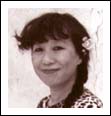INTERVIEWS:
Cool Melons— Turn to Frogs! The Life and Poems of Issa
By Matthew Gollub
Illustrations by Kazuko G. Stone
The following excerpt is reprinted by permission from the article: Cool Words Turn to Poems, by Jennifer Johnson. It was first published in the September/October 1998 issue of Creative Classroom.
 Kazuko G. Stone, Illustrator:
Kazuko G. Stone, Illustrator:
Kazuko G. Stone grew up in an old neighborhood in Tokyo, where she says, "life was very safe, quiet, and clean." But at school, she adds, "creativity was not always encouraged because the Japanese educa-tional system is based on memorization, rather than on research and original thinking."
The artist has known and enjoyed Issa's poetry since she was a child. "Issa is a much admired poet in Japan," she says, "because he writes about animals and insects with great sympathy. In the Japanese Buddhist tradition, protection of all life is a central, cultural theme."
Stone researched her topic by reading about 2,500 of Issa's poems, as well as two books about his life. "I selected the poems that I liked the most and could visualize," she says. "I also visited his home in Kashiwabara, north of Tokyo. Although his house burned down in the last year of his life and he had to spend his last months in a small grain store- house, I did not feel a sense of sadness there. I felt that Issa's life as an artist distracted him from his surroundings and saved him from despair."
Inspiration to pursue her art and writing career came from a fifth-grade teacher: "Mr. Doi, who was also an artist, was unusually skillful in illustrating all of his subjects on the chalkboard. His drawings amazed and dazzled me. When we read the Tales of the Arabian Nights, he had us create an entire puppet show of the stories, along with all the scenery. He awakened me to the possibilities of drawing and painting. We became good friends, and I still visit his studio whenever I am in Japan."
 Matthew Gollub:
Matthew Gollub:
Known as the "world's shortest poetry" haiku has exactly 17 syllables in three lines, with five syllables in the first line, seven in the second, and five again in the third. Students may notice that the haiku in Cool Melons do not necessarily have 17 syllables. That's because they have been translated from Japanese. (Japanese words typically have more syllables than their English translations.) Here are other interesting facts:
-Haiku is very old. it originated in Japan, where poets have been writing for several hundred years, even before Issa's time.
-Traditional haiku depicts a single moment in nature. It is usually based on a discovery or an observation.
-A haiku is like a quick line sketch. It's up to the reader to imagine the details and to make the picture complete In a sense, we can think of a haiku as a telegram, for example: "Should arrive Tuesday, supper time." From this short message, we can infer that, weather permitting, the sender will arrive on Tuesday, and after the tiresome journey, she would appreciate a good meal.
-Often, haiku describes two events side by Side, such as: "Plum tree in bloom/a cat's silhouette/upon the paper screen."
-Almost all traditional haiku convey a sense of season. But rather than name the season outright, most haiku rely on a word or to suggest the season indirectly. For example, "blossom" is a kigo for spring.
About This Title
Guided Reading:
PLexile:
AD860LInterest Level:
Grades 1 - 6Reading Level:
Grades 3 - 3Themes
Nonfiction, Poetry, Environment/Nature, Biography/Memoir, Asian/Asian American Interest, Earth/Sun/Moon System, Empathy/Compassion, Gratitude, Water
Collections
Asian/Asian American English Collection Grades 3-5, Biographical Poetry Grades 3-6, Fluent Dual Language , Fluent English, Biography and Memoir Grades 3-6, Appendix B Diverse Collection Grades 3-6, Poetry Grades 3-6, Nonfiction Grades 3-6, High-Low Books for Preteens (Grades 4-6), Lee & Low Poetry Collection, Earth Day Poetry Collection , Japanese Collection, Asian American Collection English 6PK, English Guided Reading Level P
More Info
Want to know more about us or have specific questions regarding Interviews?
Please write us!
general@leeandlow.com













